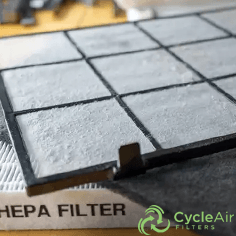
Pros and Cons of The Various Types of Home Air Filters
| Scott C
When it comes to furnace filters / HVAC air filters, homeowners have several options to choose from. The most common types of filters are disposable fiberglass or pleated filters, which are made from synthetic materials and must be replaced regularly. While these filters are relatively cheap and easy to find, they need to be replaced every one to three months. Additionally, because they are single-use and made from synthetic materials, they are not environmentally friendly. Single use filters cannot be recycled, and all go to landfill. Since the majority of household HVAC systems use these, that's over 250,000,000 disposable filters entering landfills every year from the US and Canada alone!
Another option is the high-efficiency particulate air (HEPA) filter. These filters are designed to capture a very high percentage of particles, including dust, pet dander, and pollen, but they are also expensive and have to be replaced frequently, just like single use filters. Additionally, the HEPA filter is not washable and not safe for reuse. Most HVAC systems cannot handle a HEPA filter as there is a considerable pressure drop, so instead homeowners should pick an optimal filter that ensures adequate airflow while filtering from dust and allergens, and use a HEPA filter in a dedicated air purifier.
For homeowners looking for a more cost-effective and environmentally friendly solution, a permanently reusable and washable furnace air filter such as Cycle Air Filters is the way to go. Cycle Air Filters are made of 100% recycled materials, making them the first and only of their kind on the market. Not only are they good for the environment, but they are also good for your wallet. These filters can be easily sanitized in your household laundry and reused over and over, eliminating the need to replace or repurchase.
In addition, switching to Cycle Air filters can also help to lower your household's environmental impact. These filters can capture a large percentage of particles such as dust, pet dander, and pollen, while reducing the amount of waste generated by disposable filters. They are also made domestically which reduces the carbon footprint.
Looking for more?
16x25x1 filter
20x20x1 filter
20x25x1 filter
16x25x4 filter
16x25x5 filter
25+ sizes in stock:
Size Guide

Leave a comment
Your email address will not be published.